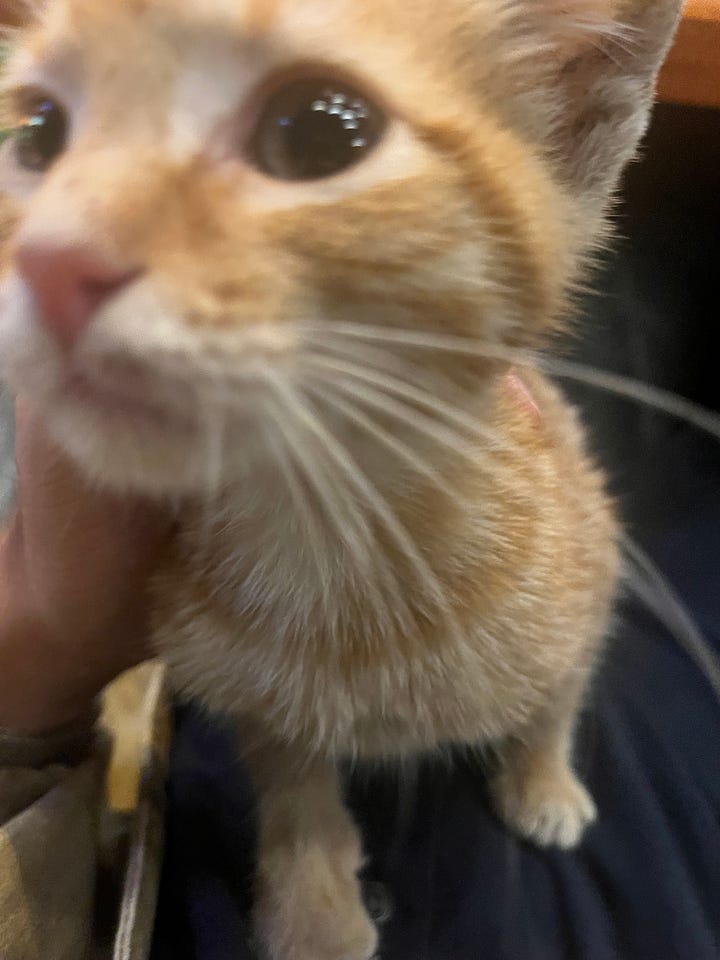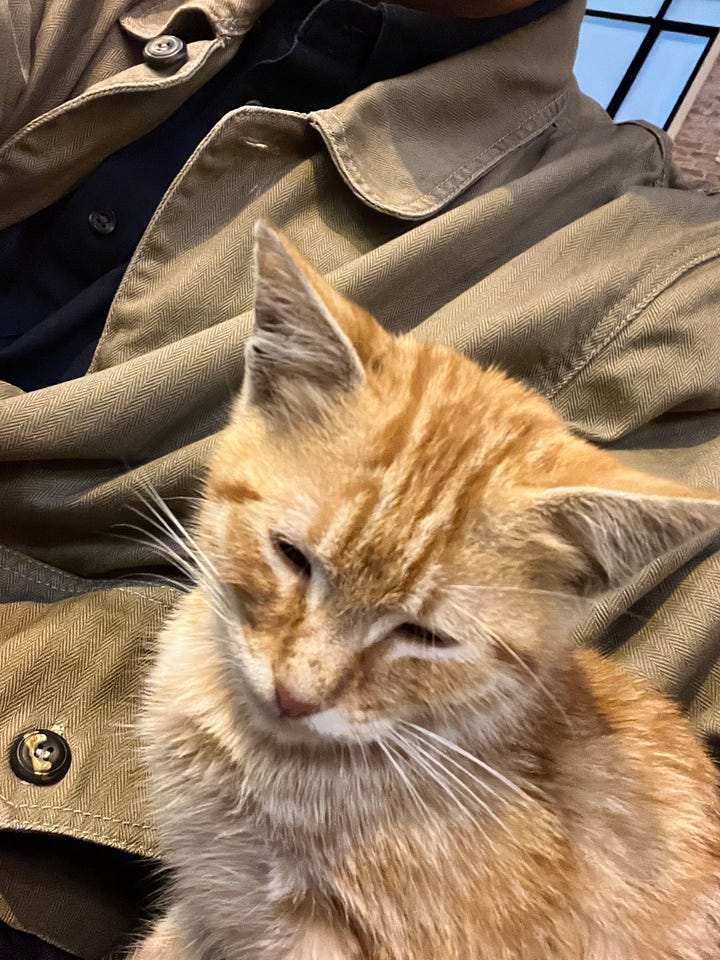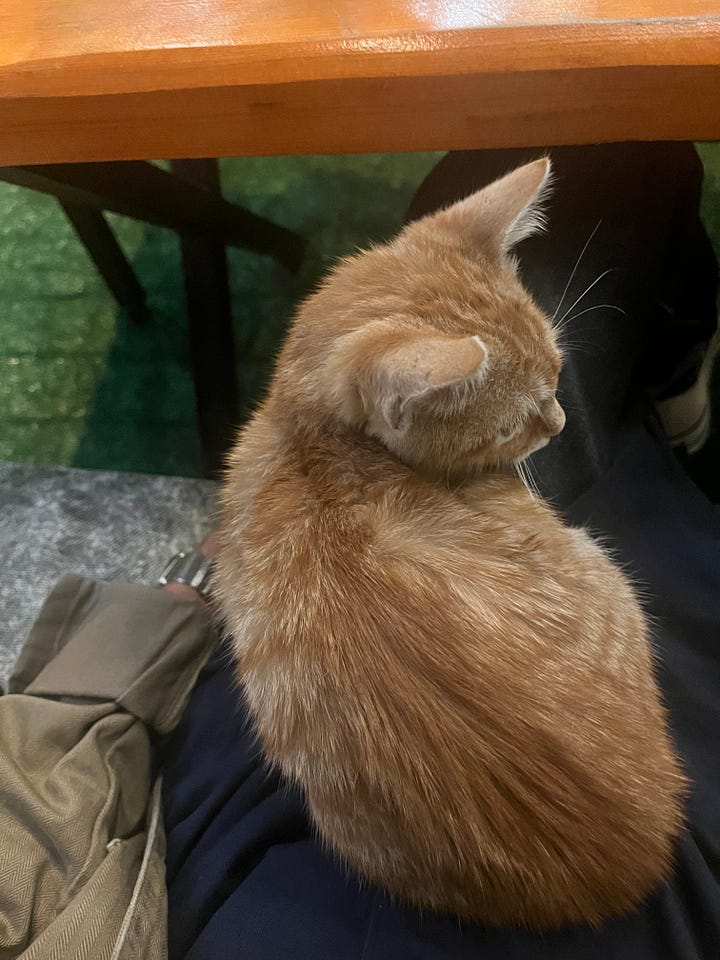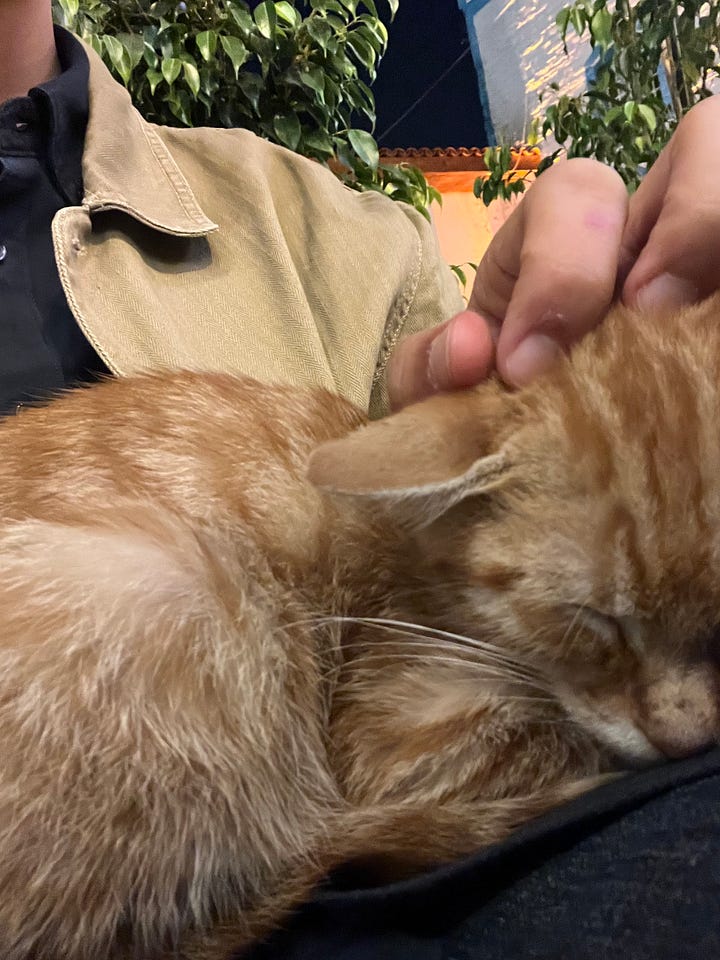For an hour and a half in November, I am the happiest I have been this last 18 months.
I am in Istanbul, sitting outdoors at a restaurant when a stray kitten crawls into my lap. It takes me a second to realise it is not here for me.
It is here for my food, which it ploughs into with the kind of pure and savage hunger only animals are capable of. By the time I notice and lift it off my plate, its face is covered in sauce and it has kebab hanging off its teeth. It looks like I've peeled a small lion off a fresh and steaming carcass.
I feed it what I can—bits of tuna salad and grilled meat—and with each bite it begins to calm down. It shivers less and the growling in its tiny body subsides. When it's done eating, it folds itself into my lap and goes to sleep. Somewhere in my chest, a candle flickers to life.
The thing is, I did not come to Istanbul for the cats. But in this moment it feels like I was meant to be here for the cats.
Perhaps there is a lesson here, in how cats are not trying to be anything other than what they are. My reward is that I too get to be myself—a living, breathing heat source with food and a warm jacket; a human being scratching the head of a small animal, in awe of how much joy it is possible to feel in something so unremarkable.
Or maybe it is also not so unremarkable after all, that sometimes we get to hold and be close to things that are warm and alive, things that in their own innocent way have chosen us, and in return we decide that we will allow ourselves to be chosen.




Heading into the end of 2024, I've been feeling like I spent very little of this year writing about what I actually needed to write about. I published pieces of writing I'm proud of, but for the most part, I wrote around the things I really wanted to say.
I don't think it's because I lacked the words. Instead, I've been nursing a quiet, delusional hope that if I didn't confront these things in the light of day, maybe I could still believe that they didn't happen.
Perhaps this is one of those afflictions of being a writer. We want to keep so much to ourselves, to keep living our favourite stories on the inside, yet there is a part of us that knows this cannot be. Life, real life, is lived on the outside, in the choices we make, the conversations we have, the things we do, and the people we become.
So this is what has taken me over a year to say.
18 months ago, I ended 3 relationships. I quit full-time work, closed the chapter on the first true love story of my life, and decided I was done drinking alcohol.
If we are lucky, relationships are invitations to become more of who we already are. But sometimes, when we are troubled, ignorant, and searching for the feeling of home, we concern ourselves instead with making relationships work, with making them last. We play roles and characters, fabrications that help us preserve some external facade of what we think we want, but in fact are disconnecting us from what we really need.
Then one day we wake up and realise what we have lost. We did not do it intentionally, and we did not do it all at once. One could even say we had a lot of fun along the way.
But the truth is: we are right back where we started, and we did not find what we were looking for. Can we say that we really did not know what was happening? That we were genuinely blind to what is now so plain?
There is a saying that alcoholics tend to become emotionally arrested at the level of maturity when they became serious problem drinkers. In Blackout, Sarah Hepola writes that quitting drinking was the first true act of her adulthood.
All these things have been true for me.
I started drinking professionally when I was 21, and never really took a day off. Since stopping, all I've been doing is processing the grief of everything that's happened in the last 12 years—decisions I both made and didn't make, seeing with so much clarity how I fell short of the person I wanted to be.
With that has come a lot of the things I've been running away from: anger, sadness, guilt, regret. Heavy heavy shit that for a long time was much easier not to look too closely at.
I am writing about this now because it was one thing to own up to all of this. Moving forward in the aftermath has not been so easy.
In the TV series Shrinking, there is an episode in the most recent season where Gaby's sister Courtney, who is a recovering addict, laments that she made a few years' worth of mistakes and now feels like she's being made to pay for them with the rest of her life.
"It's like nothing I do will ever be enough!" Courtney says, which Gaby finds extremely challenging to accept because of all that she endured when Courtney was deep in the throes of active, full-blown addiction.
But Gaby also knows that her sister is right. Courtney has suffered the consequences, she has been punished many times over, and she has made more than her fair share of amends.
When I was reflecting on the things I want to bring into 2025, this was one thought that surfaced: Things will hurt both more and less than I expect. Feel what needs to be felt, but don’t punish yourself for what has already finished.
I was quite proud of how I managed to sum this up so nicely for myself, because I am SO BAD AT THIS. Sometimes I can avoid feeling difficult things, only to be eventually confronted by them in ways I can no longer escape. In processing all the guilt and sadness that comes with this, I can keep finding ways to inflict suffering on myself, to cut myself off from love, and to tell myself that it still needs to hurt more, as though I will finally get to a point where the pain rips a hole in space and time, and I can step back into the past and fix it.
Yet it doesn't work this way. And now, more than a year later, wisdom has become possible.
What is wisdom? Wisdom, I'm guessing, is realising that the goal is not to keep punishing myself.
Instead, it is to do better.
This is one of those counter-intuitive paradoxes of life. When we think we are undeserving of things like love and forgiveness, we end up behaving in ways that seek to earn, win, or even subdue these things, or we can deny ourselves the experiences that would bring these things into our lives. In doing so, we end up hurting both ourselves and the ones closest to us.
But if we can embody a whole-hearted acceptance of our wretchedness and our innocent fallibility, then we can start acting clearly. We can be measured, healthy, and safe.
Over the last couple of months, I've heard myself say this several times: "I just want to finally start living my life." I've said it to friends, to my Enneagram teachers, and many times out loud to myself.
This newsletter has evolved a lot since I started publishing in 2021. I think of it as having gone through seasons, much like how musicians will release new albums and you can see how their music mirrors the life transitions they've been navigating.
Sometimes people tell me that my writing can be heavy and somewhat depressing, and I take this feedback seriously because at the heart of it, I have always been interested in revealing the truth of what life is really about. And life is very much about the hard moments.
At the same time, I can see where these people are coming from. It is in this vein that I recall something I once read:
What’s surprising to me—this is something that comes from society—is that we think of younger people as wild and free and open and interesting. Many times, it is exactly the opposite. Younger people can be heavy, taking everything so seriously. While sometimes older people are freer. They definitely have more of a sense of humor and lightness about things.
Elinor Carucci, This is (Almost) 53: Fine Art Photographer Elinor Carucci Responds to The Oldster Magazine Questionnaire
This is not to say that I intend to pivot into writing only happy things, but that I too am trying to find that balance where we can look squarely in the face of life's anguish and still discover in it the gifts of freedom, joy, and becoming.
I often say that this newsletter is probably the purest and most authentic expression of who I am. When I am writing this I am not trying to impress anyone, to seek any kind of validation, or to optimise for certain material outcomes.
But I am also reminded that this newsletter is really just a window into what my life is like on the inside. Looking at my life as a whole, there are spaces where I am creative, disciplined, and visionary, and there are places where I am soft, stable, and yielding. I can be funny, assertive, and spontaneous, but I can also be dumb, distracted, self-righteous, reclusive, and melancholic.
As much as there are things I continue to struggle with, I no longer see life as a pointless, unjust, and endlessly gruelling expedition. Perhaps this doesn't show up as much in my writing, and I do want to find new ways to do more of that. I want my writing to ignite things in people.
And so as I continue publishing this newsletter, I think I'm aspiring to a little more honesty, a little more courage, and a little more defiance. I want to lean more into my experiences to see them for what they have been—mistakes, lessons, triumphs—and still be able to speak to the steadfast pursuit of a life worth fighting for.
To me this means writing less abstractly and more concretely on the questions of love, friendship, addiction, healing, meaningful work, and the journey towards being more alive in our existence.
It also means preserving a lot of the raw, emotional texture that I think makes my writing what it is.
On that note, I wanted to say thank you to everyone who has continued to read what I write; for those who haven't stopped paying for your subscriptions despite my inconsistency, and for those who tell me how much my work means to you. There are no words for how grateful I am and how much I appreciate the safety I've found in having my inner life witnessed by both strangers and loved ones.
Here's wishing everyone a very happy new year—may you too be held and treasured in all your beautiful human-ness.
See you at the next one 👋🏻
As always, if you want to support introspective long-form writing like mine, do consider upgrading your subscription.



Loved this, all your honesty Julian! "This is one of those counter-intuitive paradoxes of life. When we think we are undeserving of things like love and forgiveness, we end up behaving in ways that seek to earn, win, or even subdue these things, or we can deny ourselves from the experiences that would bring these things into our lives. In doing so, we end up hurting both ourselves and the ones closest to us." 🥰 Happy new year!